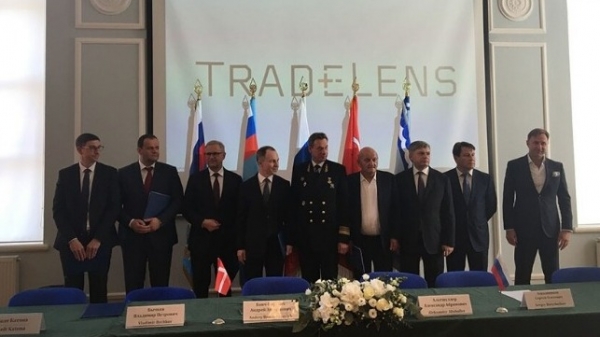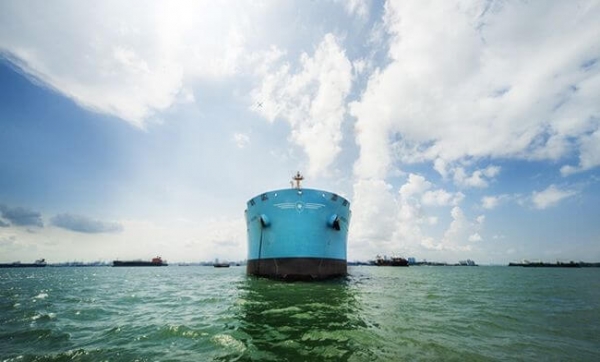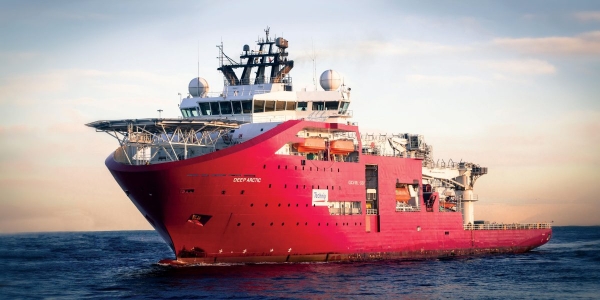Maersk Furthers Business in Russia
A.P. Moller - Maersk and Russian Ministry of Transport signed a Memorandum of Understanding on June 5, enabling the launch of TradeLens in Russia. The blockchain enabled platform, jointly developed by Maersk (through its subsidiary Maersk GTD Inc.) and IBM, is expected to significantly facilitate international trade, not least by the inclusion of the Port of St. Petersburg, Russia’s main container gateway, as part of the pilot launch.
The agreement, signed by Maersk CEO Søren Skou and Yuriy Tsvetkov, Deputy Transport Minister, enables the implementation of TradeLens on the Russian market with the aim of introducing digital documentation flow in what is currently mostly paper-based transportation processes.
“The main result of the implementation of TradeLens, according to our expectations, should be an increase in the transparency of the contracting procedure by distributing information about supply and demand, conditions and operations between many participants of the transport and logistics processes” said Tsvetkov.
Last week it was announced that more carriers will be joining the blockchain-enabled digital shipping platform, which will result in data for nearly half of the world’s ocean container cargo shortly available on TradeLens.
TradeLens enables participants to connect, share information and collaborate across the container logistics supply chain ecosystem. Members gain a comprehensive view of their data and can digitally collaborate as cargo moves around the world, helping create a transparent, secured, immutable record of transactions.
With more than 100 participants on the platform today, TradeLens is already processing over 10 million discrete shipping events and thousands of documents each week, providing shippers, carriers, freight forwarders, customs officials, port authorities, inland transportation providers and others a common view of transactions, which can build trust. A commitment to data ownership rights and permissioned access to data helps ensure privacy and confidentiality, while enabling users to collaborate more efficiently with real-time access to shipping data.
Maersk to build its first cold store in St. Petersburg
Also on June 5, Maersk participated in the ground-breaking ceremony for the new warehouse in St. Petersburg. Constructed by the Russian industrial developer PNK Group, the 23,700 square meter facility will be located within the PNK Park Sofiyskaya KAD in St. Petersburg. It will have 35 docks able to serve daily throughput of up to 200 trucks. The maximum storage capacity will be over 50,000 tons, and the fully Maersk-operated warehouse will employ over 200 employees.
Approximately 40 percent of the new warehouse will be occupied by European fruit company Fyffes, with the remaining capacity available for other customers from the fresh and frozen produce segment. The new cold store will enable Maersk to offer end-to-end solutions to Russian customers.
The facility will offer separate storage chambers for frozen produce (-25°C), chilled (+2/+8°C), as well as for bananas, which require a specific temperature of +13°C.
Fyffes Chairman David McCann said: “Today’s ground-breaking is a very important milestone in Fyffes’ strategy to grow our business in Russia. As the largest importer of bananas in Europe, Fyffes is delighted to partner with Maersk in this new warehouse development, which will increase our ripening capacity in Russia to over 200 thousand boxes of bananas per week.”
In 2018, imports of fruit to Russia increased, with banana imports going up by one percent, citrus fruits by 7.4 percent and apples by nearly 13.5 percent compared to the year before. Experts expect fruit imports to continue to increase in the coming years. Since 2017, Russia has been the second largest importer of bananas in the world, after the U.S. and surpassing Germany.
Reference: maritime-executive.com
Maersk Signs Newbuilding Order For Four LR2s
The order is part of an ongoing fleet renewal programme in the LR2 segment. “We are building the LR2s to ensure we have a portfolio of vessels that best fits our customers’ demands. The newbuildings will help us sustain a competitive fleet in a segment that is attractive to customers and owners alike, and to retain a strong market position,” says Søren C. Meyer, Chief Asset Officer at Maersk Tankers.
The contract for the newbuilding programme was signed in a market with competitive asset prices. In May 2018, the company confirmed the order of the first six vessels. The plan is to deliver the ten LR2s from 2020 – 2022. The vessels will come under Maersk Tankers’ commercial, technical and corporate management.
Reference: maersktankers.com
Maersk Introduces Digital Ocean Customs Clearance
Danish shipping major Maersk has launched Customs Clearance online shipping management platform in seven European countries with an aim to provide simple and easy-to-use solutions.
The platform was set up for Germany, France, Denmark, The Netherlands, Poland, United Kingdom and Spain, the company said, adding that it plans to expand its offering across the world by the end of 2019.
Maersk explained that international trade is subjected to diverse and wide controls and customs regulations that need to be met to ensure that traded goods are entering and exiting legally. If a delay occurs, the entire plan gets affected. A delay causes increased expenses such as storage costs, fines, and penalties, resulting in additional problems for importers and exporters.
“This new one-stop-shop allows us to timely and efficiently handle export and import declarations for our customers. The solution provides downstream benefits of full governance and compliance, eliminates the need to provide a quote as pricing is displayed online, saving three to five minutes per quote,” Vincent Clerc, Chief Commercial Officer of A.P. Moller – Maersk, said.
“In other words, it saves our customers time, money and headaches reducing the number of intermediaries they deal with from three or four to just one as well as paperwork which subsequently reduce the time spent on transactional procedures.”
Maersk has piloted its Ocean and Customs Clearance shipping management platform for almost two years in Germany.
Reference:worldmaritimenews.com
Maersk Can't Find a Buyer for its Offshore Vessel Division
After years of trying, Maersk Group has admitted that it cannot find a buyer for its offshore vessel division, Maersk Supply Service.
Citing the continued market oversupply, extensive consolidation, years of market distress and a poor OSV sector outlook, Maersk said that the division's valuation and market cap has been reduced. This has made it difficult to find a buyer or other exit solution, Maersk said.
“We have over the past two years been investigating various structural solutions for Maersk Supply Service. However, having been unable to establish any solutions meeting our objective of creating shareholder value, we have decided to retain Maersk Supply Service,” said Claus V. Hemmingsen, Vice CEO of A.P. Moller – Maersk and CEO of the Energy division.
Maersk said that the offshore supply division has been investing in new business lines and that this effort is paying off. In 2018, about 30 percent of Maersk Supply Service’s revenue was generated from new business, including offshore wind, ocean cleanup and deep-sea mining.
“Our diversification initiatives are building presence in other markets and enable us to be less dependent on the traditional Oil & Gas market in the future," said Maersk Supply CEO Steen S. Karstensen. "With our modern fleet and skilled people, we are well positioned to take advantage of market opportunities in the future and differentiate us from our peers."
The division's 44-vessel fleet has an average age of less than ten years, and it is still accepting delivery of newbuilds that it ordered in 2014, before the market downturn began.
Maersk Supply Service is far from the only operator in the sector to face challenging business conditions. Bourbon Offshore has deferred its debt repayments, sold off ships and cut crew levels amidst persistent underutilization and low day rates. Tidewater and Gulfmark both went through bankruptcy, then merged under Tidewater's ownership.
Reference: maritime-executive.com
Quick contact

 English (UK)
English (UK)  Deutsch (Deutschland)
Deutsch (Deutschland)  Türkçe (Türkiye)
Türkçe (Türkiye)  Arabic (ar)
Arabic (ar)  Русский (Россия)
Русский (Россия)  (پارسی) Persian
(پارسی) Persian  简体中文(中国)
简体中文(中国) 









